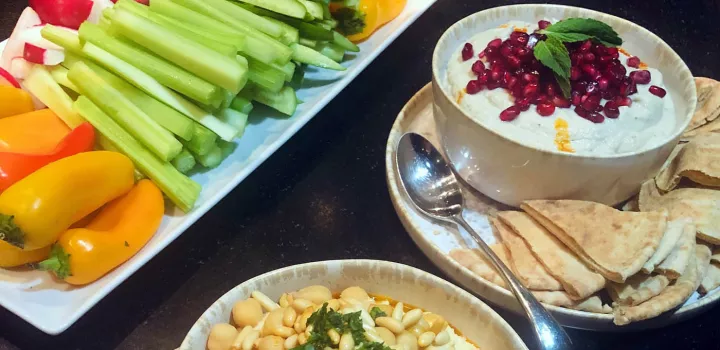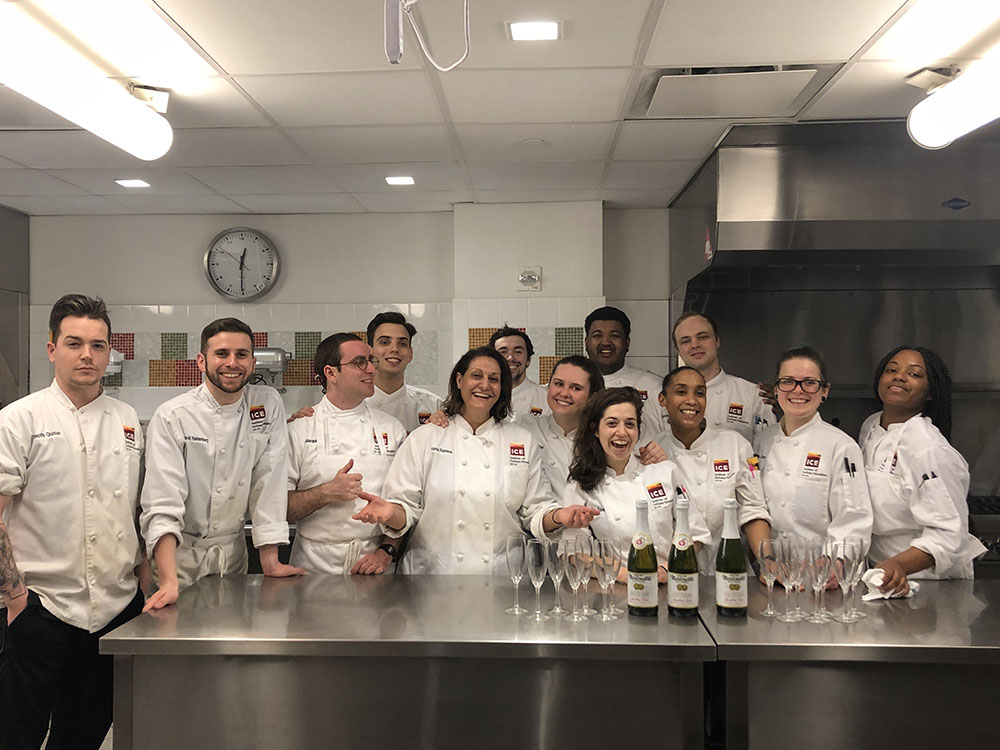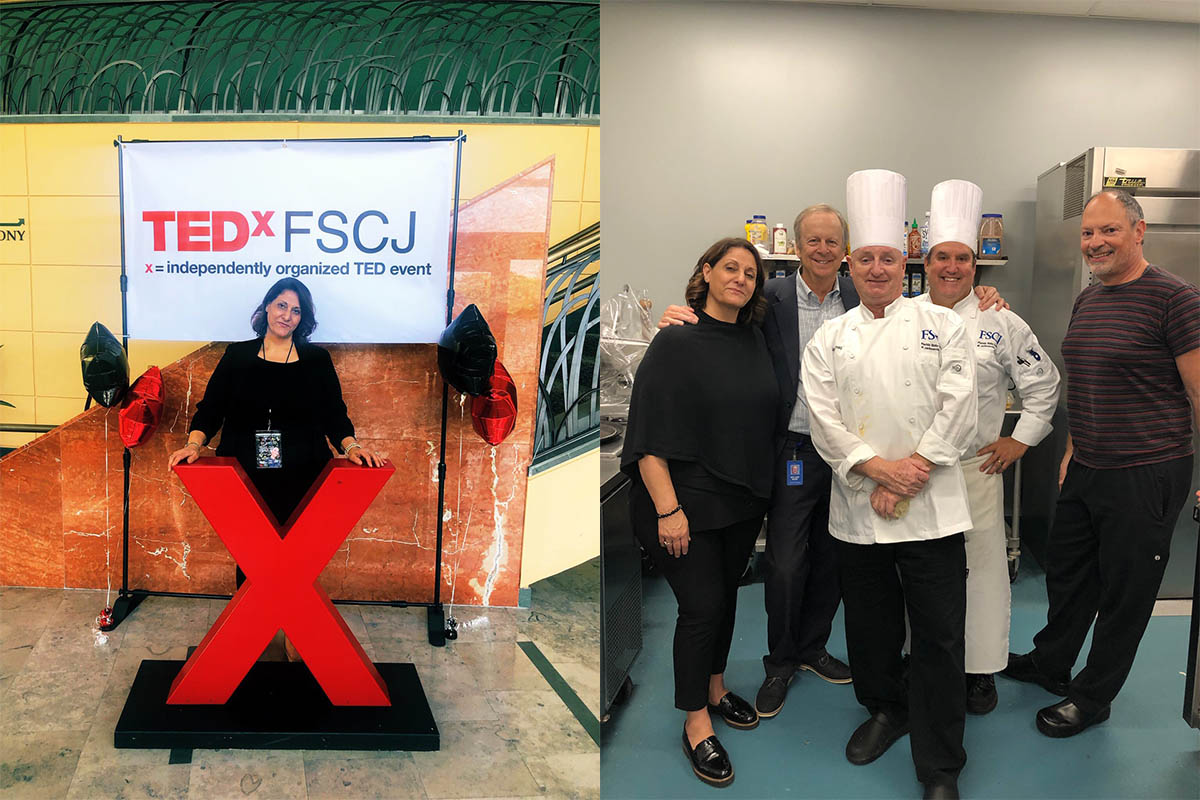
The ICE Extern Bringing Israelis and Palestinians to the Table
Hanan Rasheed founded My Healing Table while in culinary school and prepared her first TEDx talk in the midst of Culinary Arts practicals.
After 45 years of cooking for her five children and eight grandchildren, Hanan Rasheed (Culinary, ‘19) is working alongside renowned chefs everyday during her externship at the James Beard House — and continuing to unite people at her own table.
Hanan taught herself to cook when she moved from Palestine to California at age 14.
“I missed the smell and the taste of home, and at that time in the States, nothing resembled the Palestinian food that my mother served; so I started cooking her dishes from memory,” Hanan says. “By doing that, I made myself safe, comfortable and at home in the U.S.”
Years later she prepared food for her kids’ school classes, soccer and basketball teams, meetings and fundraisers. She’s since catered, owned delis and even been a personal chef. When her kids grew up, three became working moms, two of whom took a Thanksgiving pie class at the Institute of Culinary Education (ICE). “They were so excited,” Hanan recalls. “The pies came out so beautiful, and we all enjoyed them at Thanksgiving dinner. They said, ‘Mom, this place is amazing. You should take a few classes when you’re in New York.’ That’s how it started.”
When she considered finishing college, Hanan’s family suggested pursuing her love of feeding people at culinary school instead. She met with Ron Toomer, an Admissions representative at ICE’s New York campus, and says she was so overwhelmed, she cried on the way back to her daughter’s home. “I was blown away. I felt so at home. I felt this is my calling. This is what I need to be.”
She started morning classes in October 2018 after concluding, “I love food. I know how to cook, and I know what food tastes like, but I need to continue this journey of food with organization and technique.”
In the first month of classes, Hanan felt her confidence wane. “They had to kind of reprogram me,” she says. “They told me, ‘that’s not how you hold a knife.’ I said, ‘what do you mean that’s not how you hold a knife? I’ve been chopping onions for 45 years.’”

By March, Hanan was making a dish from her hometown for a recreational class — in which she was a student. “Kunafeh (knafeh, kanafeh) is not only from Palestine, but everyone in the world knows kunafeh was created near my town, in Nablus in the West Bank,” she says. When she saw a guest instructor had the cheese and dough pastry on his menu, she offered to make her version so the class could taste the difference. Hanan made so much, she saved a tray for her chef-instructors to try the following day.
“I gave it to Chef Cara Tannenbaum, Chef Dalia Jurgensen — the master of pastry — Chef Sim Cass and Chef Mike Handal, and they all said, ‘What is this? It’s insane.’ I said, ‘I told you, I can cook!’ It was amazing.”
Hanan was no stranger to preparing her native dishes for others. She started My Healing Table in the Bay Area when people with varying religious and political views, namely Palestinians and Israelis, were continuously coming together over conversations at her table.
“I cook something that both people are familiar with, which is shakshoukah (shakshuka),” she says of the breakfast dish with poached eggs in tomato sauce and spices. Hanan prepares the specialty alongside an Israeli man so that both countries are represented and the similarities are showcased. The gathering is focused on coming together over food rather than gender, religious or political issues.
“We set up the event to be equal Palestinian Muslims and Christians and equal Israeli Jewish community, and we offer space for others, too,” she explains. “We cook and open discussion for anyone to ask any questions they want. It’s a safe space; it’s a shared space; it’s a comfortable space, as long as we address each other with respect.”
Hanan and her various co-hosts prepare the shakshoukah in front of guests and serve additional Palestinian specialties such as hummus and roasted pine nuts, labneh (lebneh) and shataah, baba ghanoush, falafel, zait and za'atar, and of course, kunafeh for dessert. She invites guests to sit by people they haven’t met yet when they arrive.
“We sit for a moment as humans around the table and we treat each other as humans. We recognize that we both have needs, we both have rights and we both have pain. And that’s how we open the floor for people to act.”
At an iteration of the series at NYU in January, Hanan says guests arrived and naturally sat near the chef they identified with — Palestinians on her side of the room and Israelis on master’s student Itamar Wigoder’s side — until they came to the table in the middle of the room to taste the hummus and olive oil and compare each to the version from their homelands.
“I was delighted to see the young generation from the university open for conversation with each other. It's hopeful,” Hanan says.
After a successful event at NYU, Hanan was invited to give a TEDx talk at Florida State College at Jacksonville (FSCJ) in Florida. When the organizers saw ICE in her bio, they invited her to teach a culinary class and host a Healing Table event on campus. Hanan served 40 guests alongside students and professor chefs the weekend of her speech.
“I just started talking to them, an ordinary mom looking at other parents,” she says of overcoming her nerves on stage. “I said, ‘I have a table open for you, will you keep a seat open for me?’ And I had a line of people saying, ‘You always have a seat at my table.’”

Hanan returned to New York to start her externship at the landmark James Beard House, where she works with chefs from around America. In a given week, she might work alongside chefs from Puerto Rico, California and South Carolina. She’s met chefs from a restaurant her family frequented in Manhattan Beach and has found lessons from ICE coming to life.
“It’s so funny. I did a library assignment for Chef Dalia about something that I had never heard of, called agar-agar,” Hanan shares. “Then for the past two weeks, that’s all I’ve been working with. It’s all coming around, what I’ve heard, what I’ve seen and what I learned. I’m seeing these top chefs from all over using that same stuff that I learned at ICE. It’s amazing. It’s an amazing food culture that you guys have here in New York.”
She plans to combine her education with these experiences cooking and providing hospitality at the James Beard House to grow her Healing Table dinners and teach others along the way.
“Being a student at ICE gave me the confidence and support I needed to take this small idea and make it spread on a larger level,” Hanan says, admitting she is “having withdrawals” working off campus. “My passion has been teaching cooking classes with the goal of supporting women and young girls who find themselves in the same situation I did 45 years ago, which is not knowing how to cook to sustain themselves and feed their families. The love for sharing my Palestinian dishes with others drives me to want to be an instructor so I can show the beauty of my country and its cuisine.”
Watch Hanan’s Healing Table video, and follow your calling with ICE’s career programs.


Add new comment